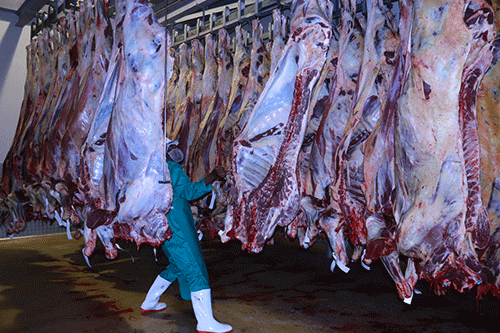Disgruntled previously advantaged commercial farmers have approached authorities in Ghana to stop buying Namibian beef from the northern communal areas, as it is allegedly contaminated with foot and mouth disease.
This is a slap in the face of the government and Meat Corporation of Namibia’s (Meatco) efforts to create alternative markets for destitute northern farmers.
Presently, NCAs’ producers are locked out of the mainstream beef economy that is only accessible to commercial and communal farmers, south of the notorious veterinary cordon fence (VCF), also known as the red line.
The details were confirmed by beef industry players, including Meatco’s CEO Mwilima Mushokabanji.
“It is true. It is not just a rumour. A Namibian delegation to Ghana actually confirmed in their report,” Mushokabanji said a fortnight ago upon enquiry.
Efforts by this paper to get hold of the report were unsuccessful.
Another impeccable source briefed on the matter corroborated Mushokabanji’s version.
“Commercial ‘white’ farmers delivered a letter to Ghanaian authorities that states the meat they import from Namibia’s NCAs was not fit for human consumption as it is infected with FMD.
“They did so to sabotage the market and for Meatco to stop operating in the NCAs,” the source who preferred anonymity out of fear of reprisal said.
There are also calls by commercial farmers south of the VCF for Meatco to completely shut its operations in the NCAs.
Approached for comment, international relations minister Netumbo Nandi-Ndaitwah was baffled, saying efforts to undermine genuine government interventions, will be opposed.
“If there is one section that is behaving contrary to that, [then] they are calling for a problem,” Nandi-Ndaitwah, who is also the country’s deputy prime minister warned.
“They should not be making threats, if it is true that they are undermining that market. [It means] they are undermining the government’s activities because it is the government that has looked for that market and now they want to destroy it? We really need to intervene seriously. That [threat] is serious,” she added.
But before the ministry takes action, it will first have to study the report, she said.
At the moment, Meatco is finalising the process to start exporting beef from the NCAs to the Middle East.
Nandi-Ndaitwah is also the ruling Swapo party’s second in command.
Last week, Swapo Youth League secretary Ephraim Nekongo came out guns blazing, threatening to grab land if Meatco collapsed.
His argument is premised on assertions that there is a deliberate agenda to collapse strategic SOEs, including Air Namibia, TransNamib and now Meatco, to advance private interests.
In some quarters, the government is seen as supporting white-dominated capital and allowing the collapse of critical industries to favour the private sector.
“If [TransNamib and Meatco] SOEs are non-performing, why not go into public private modular approach [and] give management contracts to outside partners whilst retaining a majority shareholder status?” a concerned northern farmer wanted to know.
Red line
The NCAs cover parts of the Kunene, Omusati, Oshana, Ohangwena, Oshikoto, Kavango West, Kavango East and Zambezi regions.
There are an estimated 1.5 million cattle in the NCAs.
The areas, however, do not have access to the lucrative beef markets in the European Union, which is currently reserved for those south of the red line.
The red line, or VCF, is a border that separates northern Namibia from the south.
For some, it is an animal disease control mechanism.
For others, it is an oppressive political and colonial tool, that deprives Namibians north of it of equal economic and social opportunities.
The Namibian government is currently in court, fighting for the VCF to remain intact.
In the case, Affirmative Repositioning movement leader Job Amupanda is up against land reform minister Calle Schlettwein, the government of the Republic of Namibia, attorney general Festus Mbandeka, an official from the directorate of veterinary services Hango Nambinga and the Meatboard of Namibia.
Several southern commercial farmers and cooperatives are also joining the case to defend the red line.
Nandi-Ndaitwah also addressed the elephant in the room.
“The challenge that we’re having with the red line is [that it is] for animal disease control. However, it is definitely not a good thing to have two economies in one country. Nevertheless, that is the situation we are finding ourselves in. That is why we are saying, we have to try to make sure that we have a market for the northern communal areas.
“We have to ensure that we collaborate on animal disease management,” she said.
That is not all.
“The two neighbouring countries [Angola and Namibia] are working within the international norms to see how we can make sure that we clear all our animals to be disease-free in both countries,” she said, buttressing that efforts are afoot by both governments to have their countries declared FMD-free zones.
Economics 101
This week, economist Omu Kakujaha-Matundu said decisions around the recapitalisation or liquidation of Meatco should be informed by facts, not emotions.
Meatco, he said, is of economic and national interest.
“But with the information at hand, it is difficult to arrive at an answer, whether to keep or to let go of Meatco. We need a thorough assessment of short-term and long-term economic and financial benefits pre-government involvement (farmers’ cooperative era) and post-cooperative era (SOE/current) at national level,” Kakujaha-Matundu said.
“The government should not just jump at closing a national meat corporation which could hold long-term economic benefits for the whole nation, rather than the pursuit of narrow financial interest which serves only the few.”
– emumbuu@nepc.com.na


